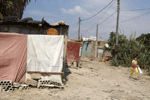Lebanon in the heart of the storm
Published on Thu, 2013-10-10 14:29
One cannot discuss policy priorities and challenges in Lebanon without first addressing the dangerous developments the region is currently experiencing. Oppression, backwardness and the shortcomings of democracy in the region as a whole are serious hindrances that could turn the tide and reverse the more positive trends. Despite the challenges they raise, the current developments clearly demonstrate the potential for change in the region: people are no longer willing to stand idle in the face of tyranny, poverty, unemployment and marginalization. Lebanon is still facing the systemic challenges of the political confessional system. The state must be an institutional and constitutional expression of democracy and people’s rights. Genuine citizenship cannot be achieved without the rule of law, without a system that gives citizens their rights and duties towards both society and the state, which are also preconditions for an effective civil society. Thus the main obstacle to true citizenship in the country is still the partition of state offices and institutions among the different religious confessions. The main challenge that Lebanon is currently facing is the immense flood of Syrian refugees, who are escaping the escalating violence and dramatic deterioration of the situation in their country. Most of them are living in very difficult conditions. Lebanese authorities have been from the beginning reluctant to provide them with any support, limiting their role to organizing the registration process. In so doing, the authorities were trying to hold the international community responsible for the refugees’ dire situation. However, as the number of the refugees drastically increased and their living conditions deteriorated seriously, the lack of support led to turmoil. Lebanon is facing alarming challenges stemming from regional situation, especially the escalation of the armed conflict in Syria. At the same time, Lebanese society is highly polarized, which has direct implications on public decision-making. Clearly therefore, the new challenges caused by the deteriorating situation in neighboring countries, plus the old challenges arising from the structural and sectarian nature of the regime, necessitate serious and immediate measures and interventions. Lebanese citizens, refugees (including the Palestinians and Syrians), as well as migrant workers are all living under enormous and increasing economic and social pressures. These challenges require immediate measures at the policy level as well as adequate resource allocations. However, the country is not able to address these challenges properly due to the deep political divide which render Lebanon a frail state under tremendous threat. |


